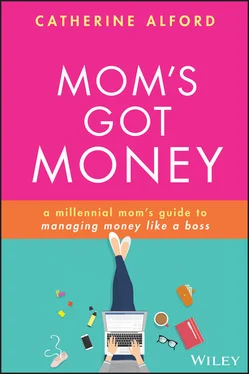When you have a negative money mindset, you feel like money is hard. It's confusing. You tell yourself it's too complicated, that you've always been bad with money, and that you can't figure it out. You try to learn about money but you quickly get overwhelmed. You might not want to ask someone for help because you feel like, as an adult and a mother, you should know the answers already. When you have a scarcity mindset, you believe—whether you realize it or not—that you don't have enough. It's hard to part with your money. You're afraid someone's going to come and take it. The worry sometimes keeps you up at night. Negative money mindsets are tricky like that.
Now let's couple that with a concept called emotional labor that's been gaining popularity as it relates to how women feel within their households. In 2017, Gemma Hartley wrote an article for Harper's Bazaar entitled “Women Aren't Nags—We're Just Fed Up.” 1 This article deeply resonated with women, so much so that Hartley wrote a book on the same topic the following year, Fed Up: Emotional Labor, Women, and the Way Forward . Emotional labor, as she describes it, is the mental weight women feel because they manage hundreds of tiny, seemingly insignificant tasks for their households and their children.
Same‐sex couples also experience emotional labor. Trish Bendix wrote a response article to Hartley's piece entitled “I Live With a Woman—We're Not Immune to Emotional Labor,” which was also published in Harper's Bazaar . 2 In it, Bendix explains that same‐sex couples can struggle with the same imbalance. For example, if one member of the partnership works from home, she might feel like she has to do more household work. For single moms, emotional labor is amplified. There is no one else to ask at home to help pick up the slack.
These tasks, which take up so much mental space, aren't necessarily put there by partners, spouses, or other family members. They are often the result of cultural norms and how society has evolved. For example, my husband never told me specifically, “Hey, you should be the one to email the twins' teachers, book parent/teacher conference time slots, and RSVP to every birthday party invitation.” And yet, I do these things. Part of it is because I like being involved in my children's schoolwork and lives, but maybe part of it is because I'm doing what I saw my mom do, even though she was a working mom too.
It's interesting that even as moms have entered the workforce in droves over the past few decades, we never quite lost that long to‐do list that comes with raising a family. Somehow, we feel responsible for, well, everything . For stay‐at‐home moms, there still remains the cultural pressure to be perfect, to plan dinner, to cater to everyone's needs, and to put yourself last. There's so much silent suffering and pain for someone who means so much to their family.
Have you ever stopped to ask yourself why?
After all, many families have joint responsibilities today and strong partnerships. For example, my husband is a phenomenal cook. He likes going to the grocery store (why, I'll never know.) You can often find him wiping down the counters and loading the dishwasher. He actually prefers to be the one putting dirty dishes in rather than taking clean ones out. Please, someone explain that to me.
But emotional labor, as Hartley and Bendix describe it, is more of a mental labor. It's the weight of the thousands of daily decisions that have to be made. It's anticipating everyone's needs, especially our children's. It's being one step ahead. It's a brain full of choices, of important dates to remember. It's feeling devoid of energy and conjuring up some more anyway.
It's the constant pressure to squeeze into the idea of what we believe is a good mom . And all of this internal chatter is invisible, so no one else knows it's there. How can our families show appreciation or say thank you when it's hard to quantify or see everything that goes on behind the scenes to keep the engine running?
Now, let's take this concept and apply it to money. According to KRC Research, “One in five moms (22%) is a millennial mom, accounting for approximately 9 million people.” And guess what? Those 9 million millennial moms “control 85% of household purchases and have a U.S. spending power of $2.4 trillion.” Even further, “33% [of millennial moms] are the majority contributor to their household's income (vs. 26% of moms in general). 3 Talk about money power. And yet, do most millennial moms feel powerful when it comes to money? Do you?
Every occasion you spend time thinking or worrying about paying for school supplies or back to school clothes, you're exercising some emotional labor as it relates to money. One time, I researched for hours to find a “better” backyard playset for my twins because I felt they had outgrown the $200 Walmart version. That was me spending some emotional labor. I even got to scoop some mom guilt on top of the emotional labor when I eventually decided their Walmart playset was fine, and I'd rather save $1,500 than spend it on a nicer cedar playset. I later mentioned it to my husband, and he said he never once thought about the type of playset they had.
That made me wonder if the emotional weight of money decisions goes away once someone becomes incredibly wealthy. Joint research by Vanderbilt University and Regions Bank says perhaps not. Their 2015 Women and Wealth survey specifically targeted private wealth management clients who had estimated household income‐producing assets of over $2,000,000. As part of their survey methodology, they said the goal of the study was “to obtain deeper insights into the perceptions and attitudes of Regions affluent customers.” 4
What they found was that “More women than men say they are solely responsible for making financial decisions for their households; however, women express lower levels of financial confidence and optimism than men.”
An earlier 2013 study by Allianz Insurance showed some interesting statistics as well. They called it the “Women, Money, and Power Study: Empowered and Underserved.” In this study, Allianz surveyed many different types of women from ages 25 to 75 who had household incomes of $30,000 or more per year. 5 They included single women, single mothers, married mothers, divorced women without children, divorced mothers, widows, and those living with partners who were not married.
Among this diverse group, they did unearth some positive findings – namely, 62% of women who responded to the survey had a “strong interest in learning more about finances and retirement planning.” Furthermore, 49% of women who responded said that “they have a great deal of responsibility for major financial decisions” and “over half say they are the primary decision‐makers.”
Yet, even with all this decision making power, lack of money confidence persisted with 49% of women respondents saying they worried about ending up broke and homeless. The study even identified a certain subset of women they dubbed “Women of Influence.” Women of Influence have higher incomes than the average woman, are more likely to be successful at work or in business, and are 25% more likely than the average woman to feel financially secure. The study said Women of Influence, who make up about 20% of all women, have more money confidence than the average woman. Yet, a startling 46% of them responded “often” or “sometimes” when asked how often they thought, “Deep down, I worry about becoming a bag lady.” 6
I share this because many women believe if they could just have more money, managing it would be easier. Yet, that's not necessarily the case. Sure, having more money is nice when you're making many, many purchasing decisions for your family. But, both of these studies show that having more money than the average woman doesn't necessarily mean you'll have a dramatic increase in money confidence.
Читать дальше












